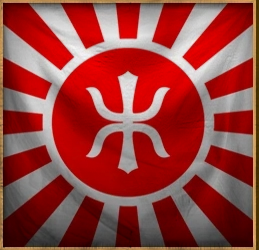
Dear sir, madam [INSERT NAME]
Following a decision by the Ministry of Defence of the Republic of Caspia, you have been selected for conscription in the National Defence Force. This decision is based on the Law on Conscription and Service of the 16th of March 2016. Pursuant this decision, you are required to report to the nearest recruitment office for physical evaluation and assignment with seven days. Failure to comply will result in a criminal conviction for desertion as meant in article 24 section 2 of the aforementioned law. Further information on payment, absence from labour and education and other obligations will be provided on request at the recruitment office.
Yours truly,
Minister of Defence,
Ersin Bayraktar
Congratulations! You have been conscripted into the National Defence Force of the Caspian Republic. Well, congratulations… I can imagine you’re not feeling so hot right now. That may be partially because you haven’t got the slightest clue what I am talking about. Not to worry, I’m here to fill in the gaps for you. In this RP, you will be taking the role of a young Caspian conscripted into the National Defence Force. Why you? Because you are a problematic demographic, but more on that later. Your nation is threatened by outside forces, and you have been called up in her defence. You don't have military skills, you are not accustomed to surviving outdoors. You are just a young person living in the wrong country at the wrong time. Keep in mind while making a character that this RP will not be about mowing down hordes of enemies single-handily. Hell, you might not even kill a single enemy, if you are lucky. Killing a living, breathing human being is hard.
Below is some history regarding the nation. I recommend reading the second spoiler, as that information is actually relevant to the story. The first spoiler holds the history of the nation, and might be interesting if you want to know your nation a bit more in-depth. Of course, not all characters will be history buffs of political nerds, so not knowing the stuff under the first spoiler certainly does not disqualify you. However, do keep in mind that certain religions and political groups have a history, so if you write a character in one of those traditions, I suggest doing a short ctrl+F.
The first vehicles crossed the Russian border two weeks ago. In response, the Caspian government has mobilised, both calling up all reservists and beginning conscription. The conscription has a two-fold objective: both getting all young people with the ability to riot out of the cities, and freeing up professional military units to keep the urban centres pacified. You are one of those conscripts, soldiers. You’re stationed along the outskirts of one of the northern cities, currently occupied by pro-Russian militias. Here, you train in the use of weapons, in standard combat drill, and some basic physical fitness. The situation on the border is tense, which is why we require vigilance at all times. No-one is happy to be there, but no matter your political affiliation, none of us wants half our country occupied by the Russian federation. I hope we can at least find common ground over that.
- Code: Select all
[size=150][b]Application[/b][/size]
[b]Name:[/b]
[b]Age:[/b]
[b]Appearance:[/b]
[b]Religion:[/b]
[b]Political Affiliation:[/b]
[b]Personality:[/b]
[b]Short Bio:[/b]
[b]Likes:[/b]
[b]Dislikes:[/b]
[b]Extra information:[/b]













